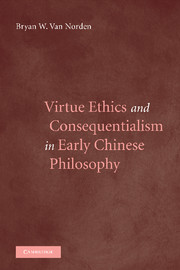5 - Pluralistic Ruism
Published online by Cambridge University Press: 25 July 2009
Summary
One who keeps warm the old, yet appreciates the new, is fit to be a teacher.
– Kongzi… a person trying to understand a text is prepared for it to tell him something.
– GadamerTHE ROAD TRAVELED
In this book, I have discussed Kongzi (Confucius), the early Mohists, and Mengzi (Mencius) using a particular methodology: one that understands Ruism (Confucianism) as a form of “virtue ethics,” interprets Mohism as a form of consequentialism, and emphasizes the careful analysis and evaluation of arguments. In Chapter 1, I noted that my approach is an “analytic” philosophical version of a hermeneutic of restoration. However, in the spirit of methodological pluralism, I do not rule out other approaches, be they postmodern, literary, social-scientific, or versions of a hermeneutic of suspicion. Of course, while granting someone the right to use their own methodology, we may criticize how successfully they have applied it.
I have critically incorporated the commentary of the School of the Way (“Neo-Confucianism”). Thinkers like Zhu Xi and Wang Yangming are worth reading because they are interesting philosophers in their own rights and are careful and insightful readers of the classics. In addition, their interpretations often color contemporary understandings of Ruism so deeply (and so invisibly) that those who ignore the commentarial tradition are doomed to repeat it. However, I agree with those (including Dai Zhen in the Chinese tradition) who argue that the School of the Way fundamentally distorts ancient Ruism by projecting onto it concepts drawn from the metaphysics of later Buddhism.
- Type
- Chapter
- Information
- Virtue Ethics and Consequentialism in Early Chinese Philosophy , pp. 315 - 360Publisher: Cambridge University PressPrint publication year: 2007



